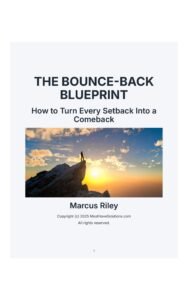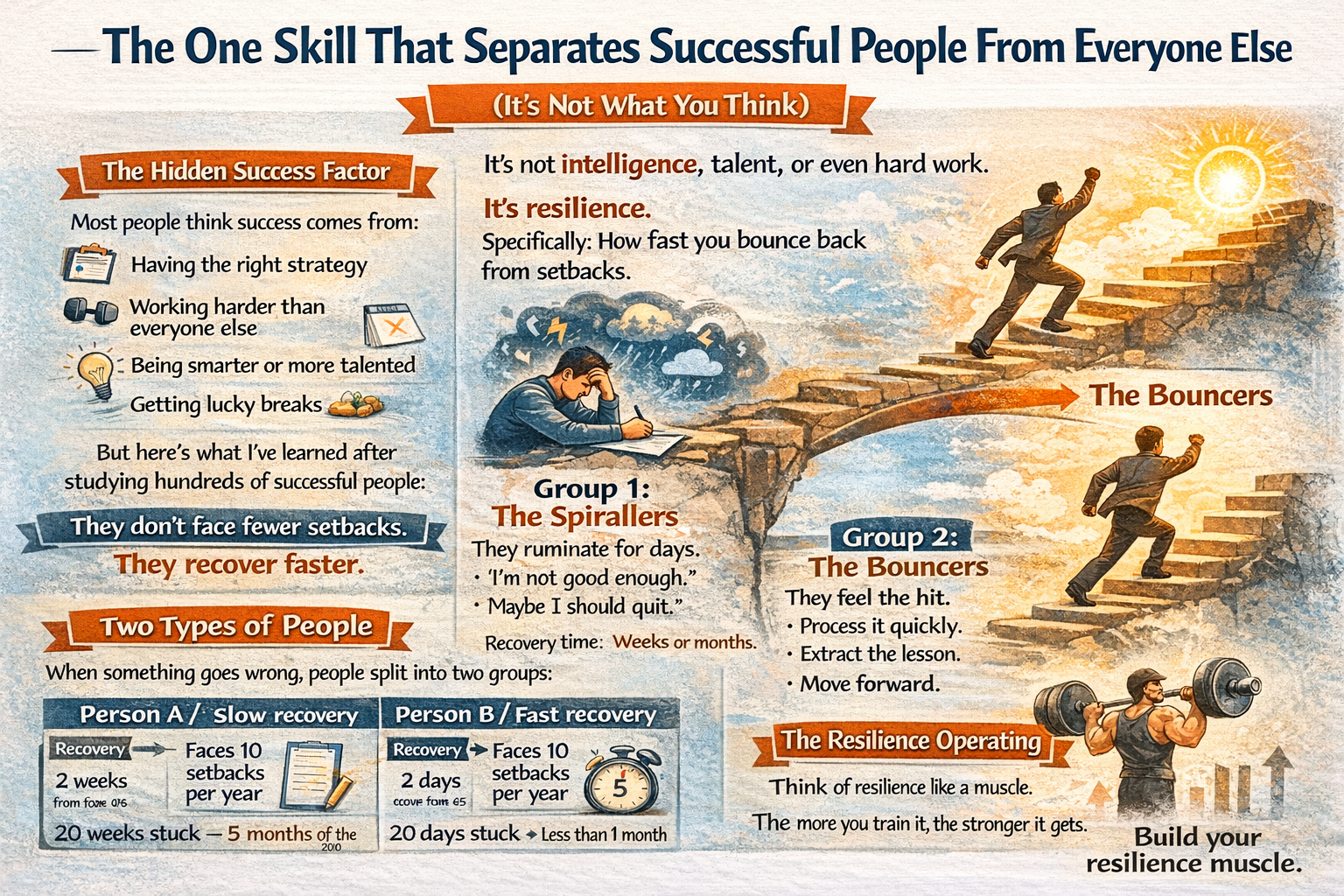
Something goes wrong.
A client says no. A project fails. A relationship ends. Money gets tight.
How long does it take you to recover?
If you're like most people: days. Maybe weeks. Sometimes months.
You replay the situation endlessly. Beat yourself up. Question everything. Spiral into doubt.
Meanwhile, some people face the same setbacks and bounce back in hours.
What's the difference?
It's not that they're tougher. It's not that they don't feel pain.
They have better systems.
The Recovery Gap
Most people think resilience is about "toughing it out" or "staying positive."
That's not resilience. That's denial.
Real resilience is about recovery speed.
It's not about avoiding the hit. It's about getting back up faster.
The gap between you and resilient people isn't strength. It's strategy.
Your Brain on Setbacks
When something goes wrong, your brain goes into threat mode.
Cortisol floods your system. Your thinking narrows. You fixate on the problem.
This is normal. It's evolutionary programming.
But here's what happens next:
Most people stay stuck in threat mode.
They ruminate. Catastrophize. Make it mean something about who they are.
"This always happens to me." "I'm not cut out for this." "Maybe I should just quit."
Resilient people have a different protocol.
The 5-Minute Reset
I discovered this by accident during a crisis.
Instead of spiraling, I grabbed paper and wrote three things:
1. What just happened? (Facts only, no story)
2. What can I control right now?
3. What's one small action I can take in the next 10 minutes?
It took 5 minutes. Maybe less.
But something shifted.
The panic stopped. Clarity returned. I moved forward.
That's the difference between spiraling for weeks and recovering in hours.
The Four-Part System
Here's the complete protocol:
Part 1: Name It (30 seconds)
Write down what happened. Just facts.
"Client said no to proposal."
Not: "I'm terrible at sales and nobody wants to work with me."
Part 2: Control Check (2 minutes)
List what you can and can't control.
Can control: My next proposal, my follow-up, my pricing.
Can't control: Their decision, their budget, their opinion.
Part 3: Next Action (2 minutes)
Pick ONE small thing you can do right now.
"Send thank-you email and ask for feedback."
Or: "Update proposal template based on objections."
Part 4: Move (30 seconds)
Do that one thing immediately.
Total time: 5 minutes.
Why This Works
Your brain needs three things to exit threat mode:
- Certainty (facts vs. story)
- Control (focus on what you can influence)
- Action (movement creates momentum)
The 5-minute reset provides all three.
It interrupts the spiral. Redirects your focus. Gets you moving.
That's how you bounce back in hours instead of weeks.
The Compound Effect
Here's what happens when you use this consistently:
Setback 1: Takes 3 days to recover.
Setback 2: Takes 1 day to recover.
Setback 3: Takes 3 hours to recover.
Setback 4: Takes 30 minutes to recover.
You're building resilience muscle.
Each time you bounce back faster, you prove to yourself you can handle it.
Your confidence grows. Your recovery speed increases.
Eventually, setbacks become minor inconveniences instead of major crises.
Your Next Setback
You will face another setback. Guaranteed.
The question is: How will you respond?
Will you spiral for days? Or will you have a system?
Next time something goes wrong, try this:
Grab paper. Set a timer for 5 minutes.
Answer the three questions.
Take one small action immediately.
Watch how fast you recover.
Ready to build bulletproof resilience? Get the complete Bounce-Back Blueprint with recovery protocols for every situation.
Start bouncing back faster here →







